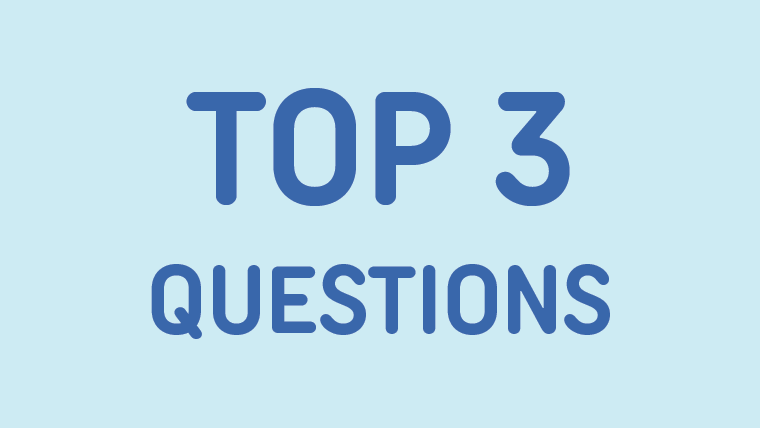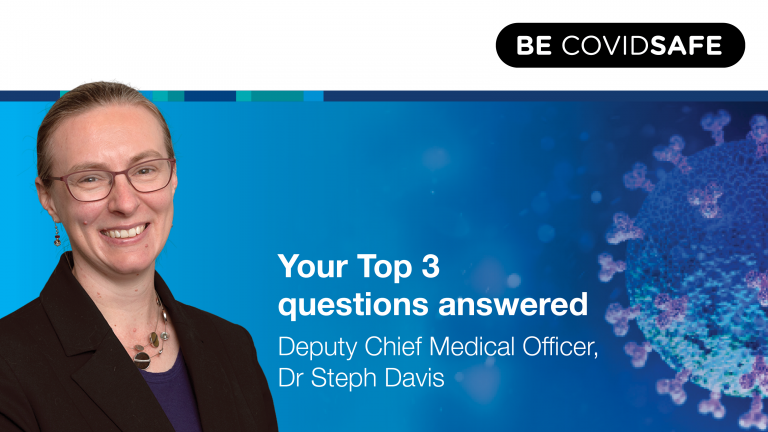
G'day, everyone. My name is Steph Davis and I'm a Deputy Chief Medical Officer at the Australian Government Department of Health, and today I'm bringing you the top three questions that have been asked across our Facebook pages and other media sites. Before I go any further, I would like to acknowledge the traditional custodians of the land on which I'm speaking from today and that's the Ngunnawal people. I would like to pay my respects to elders past, present and emerging, and I'd like to extend those respects to other people in the Aboriginal and Torres Strait Islander people in the room with me today and anyone watching this from online. My shout out today is to all the amazing health workers and other workers out there who are giving vaccine and supporting people getting vaccine. That's the GPs, the pharmacists, the nurses, the people working in vaccination clinics in security, in administration, all of you, you're doing such an amazing job to get this country vaccinated and to get us out of the pandemic.
So, my first question today is: Can you explain the differences in the variants of COVID-19?
This is a really good question and it comes down basically to virus mutations. I'm sure we've all heard about a lot of the different variants. The big one in Australia at the moment being Delta. Basically, what a variant is is it's a little bit of a change in the virus that makes it a bit different to what it was before. Viruses mutate all the time, but some particular variants give the virus a bit of an edge, so the Delta variant, for example, makes the virus much more transmissible. The original Covid virus, we reckon, infected around about two to three people on average if one person had it, whereas the Delta variant, on average, tends to infect about six to eight people from one person, so that is twice as infectious as the original variant. As you can imagine, a variant which makes the virus a bit more transmissible, gives it a bit of a competitive edge over the other variants which are circulating and because of that the Delta variant has become predominant both in Australia and all around the world. There have been other variants, you've probably heard of some of these. There's the Alpha variant and just a quick note here that the WHO has a naming convention and all variants are named after letters of the Greek alphabet. So again the Alpha, that originated before the Delta variant. We think that one was probably about 50% more transmissible than the original Covid virus or COVID-19 virus. There is also the Beta variant. The Beta variant was also a bit more transmissible than the original COVID-19 virus. As I said though, the Delta variant is the one which really predominates in Australia and around the world in most places at the moment. We also, in terms of variants, we also know they have the potential to make the coronavirus more severe and actually cause an increased risk of hospitalisation and death in some people. Now, for the Delta variant we think it probably does carry a bit of increased risk of hospitalisation and death and that risk is greatest in those who are older and those with underlying health conditions. The really important thing to remember though is even though the Delta variant is a bit more severe and certainly a lot more transmissible, it is still affected by the vaccine. So the vaccine is still very, very effective, or the vaccines we have, are very effective in preventing hospitalisation and death from for Delta variant and most of the other variants which are circulating. The other way we can keep protecting ourselves against these variants is doing all those things we've got so good at over the past 18 months, so washing our hands, wearing our masks when we are required to, keeping physical distancing and all of those things. They will continue to work no matter what variants come up.
My second question today is: Can I choose to have Moderna if I've already had one dose of AstraZeneca or Pfizer?
So the answer to this one is really no and the reason for this is because it's recommended to have two doses of the same vaccine for the primary course of vaccine and that's to be considered fully vaccinated against Covid. There are a few reasons for this and one of those is that all the evidence we've got is really looking at two doses of the same vaccine. There are some people who will have to have a different vaccine for their second dose and these are people who might have had a very severe reaction to the first dose, so maybe an anaphylactic reaction, or they might have had their first dose of vaccine in a country outside of Australia and so they can't then access the same vaccine for their second dose. But the vast majority of us will be getting the same vaccine for our first and second dose. If you've got any questions around the COVID-19 vaccines, have a look at the Department of Health website or go and speak to your health professional. Really important to remember that all the COVID-19 vaccines we've got in Australia are very effective and they're safe.
My third question today is: Why is this COVID-19 pandemic so much worse than previous viruses such as SARS, bird flu and swine flu?
So, again, this is a really good question. COVID-19 is a coronavirus and this is a family of viruses that cause respiratory disease, so it's quite a big family. It is different already from a couple of the other ones like swine flu, which is an influenza virus. In terms of why it's worse than those previous pandemics, we have to go back a little bit and think about what causes pandemics in the first place. A pandemic really happens when we have a new virus or a new version of an old virus and this a little bit similar to those mutations I first talked about in the first question and basically, as I said, viruses mutate all the time but sometimes you get a really, really big mutation which actually essentially causes almost a new kind of virus as opposed to a variant on a pre-existing virus. This has happened lots of times before, so in 2009 we had the swine flu pandemic and that was caused by a big shift in the flu virus. Probably started in pigs, hence swine flu, and then went from a pig to a human and then was able to be transmitted amongst humans. It was pretty transmissible, so on average people infected about one to two other people, but while it was quite infectious, there were a couple of reasons it wasn't as severe as the COVID-19 virus. One of those is that some of us had some pre-existing immunity from previous flu viruses which weren't the same but were similar. The second reason is it really wasn't as severe, it caused nowhere near the number of deaths and hospitalisations that the Covid virus causes, so if you got it you were much less likely to have a severe illness. Why has the coronavirus been so much worse than the SARS and MERS viruses? COVID-19 is a coronavirus, as were SARS and MERS, and SARS and MERS were actually much, much more severe, they had much higher death rates. Again, like COVID-19, they originated in animals so the SARS virus probably came from bats, as did the MERS one originally, and they probably jumped from bats via another animal into humans, but the big difference here is that COVID-19 took off between humans, so it was able to be transmitted very effectively between humans. Now, the SARS virus and the MERS virus were pretty good at jumping from animals to people but they weren't very good at being transmitted between people, so generally once they got into a person they would make them very, very sick but then they wouldn't transmit any further. And that's really the big difference, to have a pandemic as bad as this one, you need a virus which is both severe and transmissible, and COVID-19 unfortunately ticks both of those boxes. So that's why we've had such a bad pandemic but I suppose again the good news is that now we do have effective vaccines so we all need to go out and get our vaccines to try and bring this pandemic to an end, and we also need to continue doing all those things again we've got so good at over the past 18 months. We need to wear our masks when we need to, we need to do our handwashing and that's what is going to get us out of this pandemic in the end.
Thank you so much for tuning in today, particular thanks to Linda my interpreter. We'll see you all again soon.







